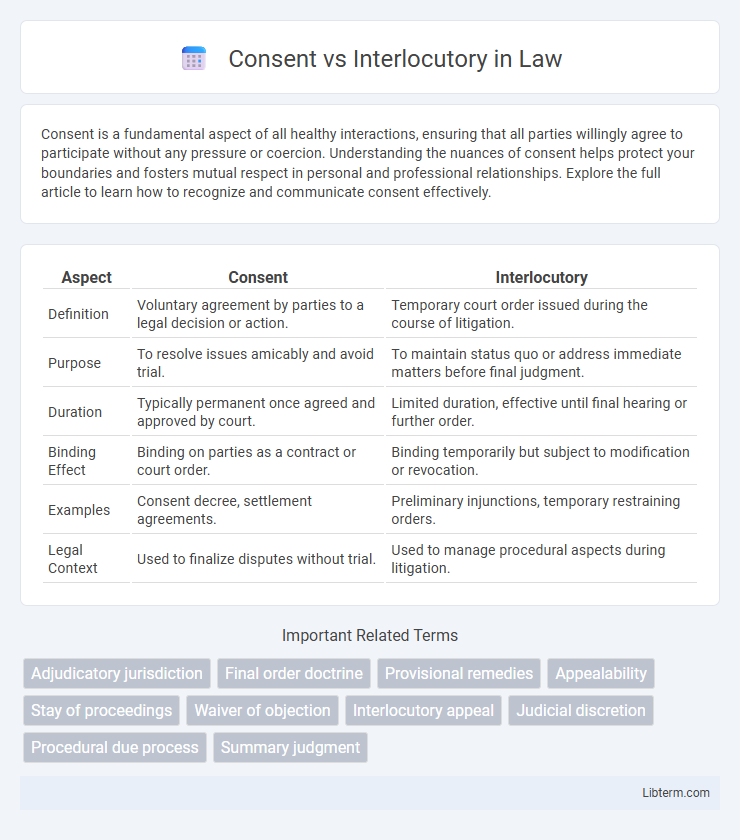Consent is a fundamental aspect of all healthy interactions, ensuring that all parties willingly agree to participate without any pressure or coercion. Understanding the nuances of consent helps protect your boundaries and fosters mutual respect in personal and professional relationships. Explore the full article to learn how to recognize and communicate consent effectively.
Table of Comparison
| Aspect | Consent | Interlocutory |
|---|---|---|
| Definition | Voluntary agreement by parties to a legal decision or action. | Temporary court order issued during the course of litigation. |
| Purpose | To resolve issues amicably and avoid trial. | To maintain status quo or address immediate matters before final judgment. |
| Duration | Typically permanent once agreed and approved by court. | Limited duration, effective until final hearing or further order. |
| Binding Effect | Binding on parties as a contract or court order. | Binding temporarily but subject to modification or revocation. |
| Examples | Consent decree, settlement agreements. | Preliminary injunctions, temporary restraining orders. |
| Legal Context | Used to finalize disputes without trial. | Used to manage procedural aspects during litigation. |
Understanding Consent in Legal Proceedings
Understanding consent in legal proceedings involves recognizing it as a voluntary agreement by parties to a specific action, impacting the court's jurisdiction and the validity of decisions. Consent often accelerates resolutions by waiving certain procedural rights, contrasting with interlocutory matters, which are temporary court orders pending final judgment. Clear and informed consent is critical in ensuring that agreements are enforceable and free from coercion or misunderstanding, thereby fostering fairness and efficiency in litigation.
Defining Interlocutory Orders
Interlocutory orders are temporary rulings issued during the course of litigation that address procedural or substantive issues but do not determine the final outcome of the case. These orders manage the progress of a lawsuit by resolving matters such as injunctions, discovery disputes, or interim relief. Unlike consent orders, which are agreed upon by parties involved, interlocutory orders are typically imposed by the court to ensure fair and efficient case management.
Key Differences: Consent vs Interlocutory
Consent orders are agreements approved by a court to resolve disputes without further litigation, providing a final and binding resolution. Interlocutory orders are temporary court rulings made during the course of litigation to address urgent or procedural matters and do not determine the final outcome. Key differences include the finality of consent orders versus the provisional nature of interlocutory orders and their distinct roles in dispute resolution versus case management.
Legal Framework Governing Consent
The legal framework governing consent distinguishes it as a voluntary agreement with clear terms, rooted in contractual law and privacy regulations, ensuring parties authorize actions or data use explicitly. Interlocutory orders, by contrast, are temporary court mandates issued during litigation to maintain status quo or address urgent issues without final judgment, governed by procedural law. Understanding consent within this legal context emphasizes its role in validating agreements, while interlocutory orders remain judicial tools to manage ongoing legal processes.
Legal Framework Governed by Interlocutory Orders
Interlocutory orders function within the legal framework as temporary rulings issued during the course of litigation, addressing procedural or urgent matters without resolving the main dispute. These orders maintain the status quo and safeguard rights until the final judgment, ensuring fairness and preventing prejudice. Unlike consent orders, which are voluntarily agreed upon by parties, interlocutory orders are mandated by the court to manage ongoing judicial processes efficiently.
Common Scenarios Involving Consent
Consent in legal contexts often involves parties agreeing to a specific action or decision, such as waiving certain rights or approving procedural steps, ensuring smoother litigation processes. Interlocutory matters relate to temporary or provisional court orders during ongoing litigation, such as injunctions or discovery disputes, which require timely decisions without final judgments. Common scenarios involving consent include parties agreeing to extend deadlines, approve document exchanges, or accept procedural modifications, thereby avoiding contested interlocutory hearings and expediting case management.
Common Scenarios Involving Interlocutory Applications
Interlocutory applications commonly arise in civil litigation to request interim relief such as injunctions, stay orders, or discovery directions before the final judgment. These applications differ from consent orders, which are mutually agreed upon by parties and endorsed by the court to expedite case resolution. Key scenarios include temporary injunctions to prevent harm, interim custody orders in family law, and orders for preservation of evidence.
Importance of Consent in Judicial Process
Consent in the judicial process serves as a fundamental mechanism that facilitates efficiency and mutual agreement between parties, reducing the burden on courts by avoiding unnecessary trials. Unlike interlocutory orders, which are temporary rulings during the progression of a case, consent judgments represent final decisions agreed upon by the involved parties, ensuring enforceability and legal certainty. Emphasizing consent enhances procedural fairness, accelerates dispute resolution, and preserves judicial resources by limiting contentious litigation.
Implications and Appeals of Interlocutory Orders
Interlocutory orders, issued during the pendency of a case, often involve procedural or preliminary matters and can significantly impact the course of litigation by resolving key issues early. Unlike final orders, interlocutory orders typically allow limited appeals, requiring parties to show specific grounds such as substantial prejudice or importance to justify appellate review. The implications of interlocutory appeals influence case strategy, as courts balance the need to avoid undue delays against ensuring critical legal questions receive timely examination.
Consent vs Interlocutory: Practical Considerations in Court
Consent orders streamline court proceedings by allowing parties to agree on terms without a trial, reducing time and legal costs. Interlocutory orders address urgent, procedural, or temporary issues during litigation, ensuring case management and fairness before the final judgment. Understanding the scope and application of consent versus interlocutory orders aids efficient case resolution and strategic legal planning.
Consent Infographic

 libterm.com
libterm.com